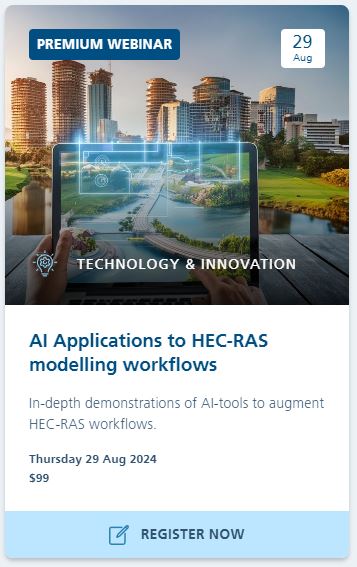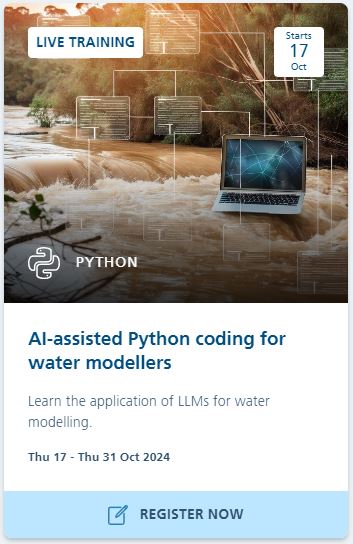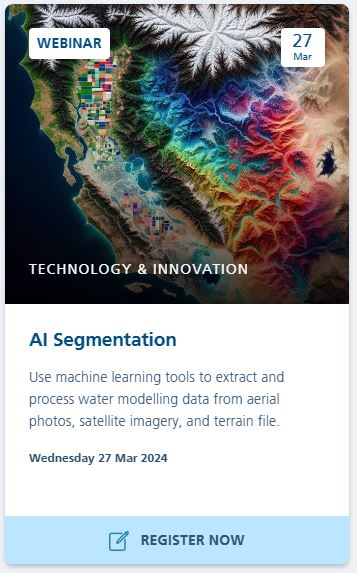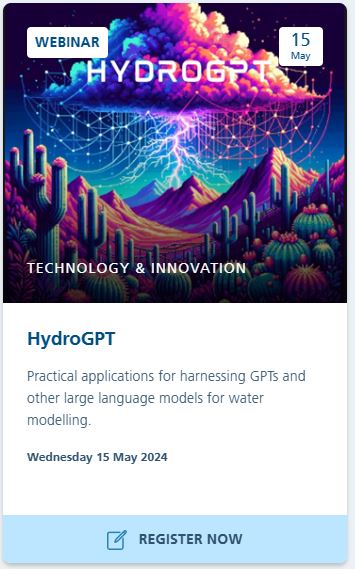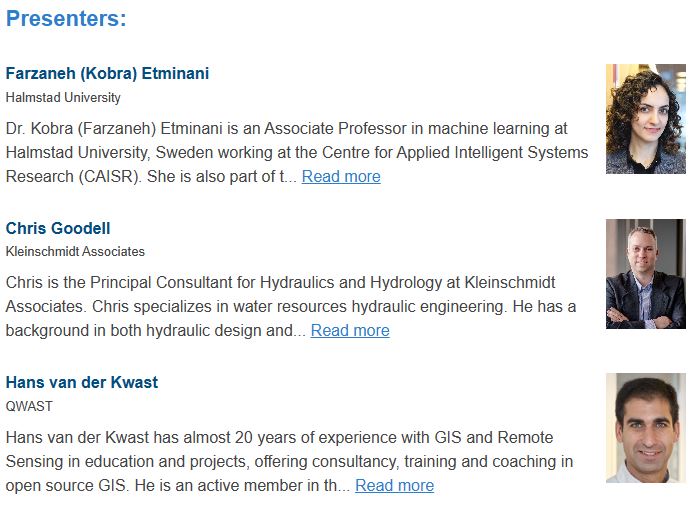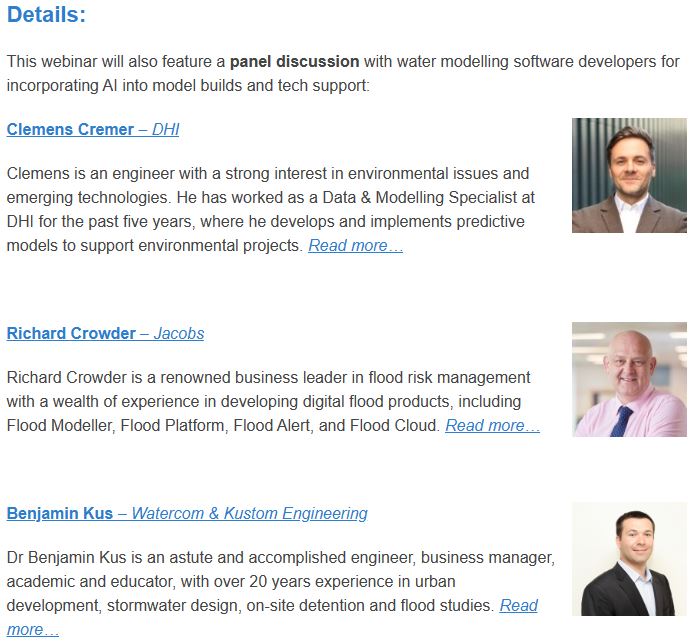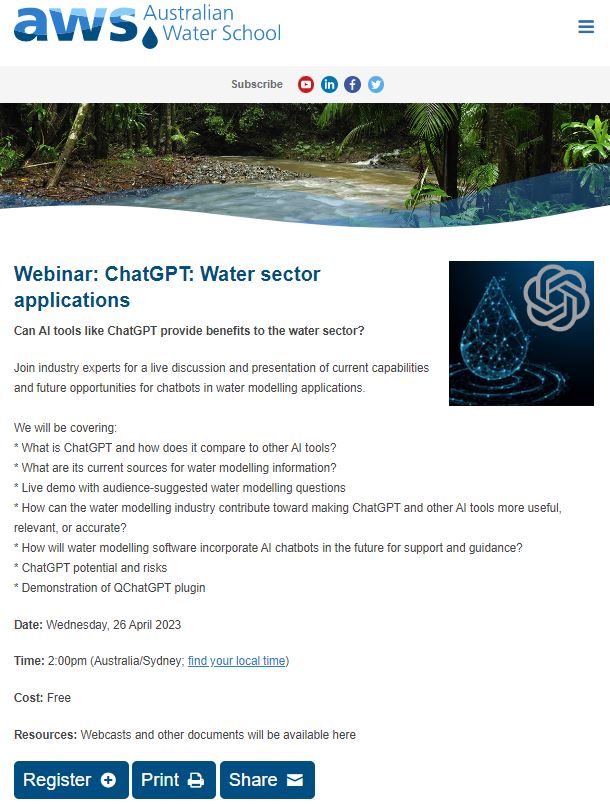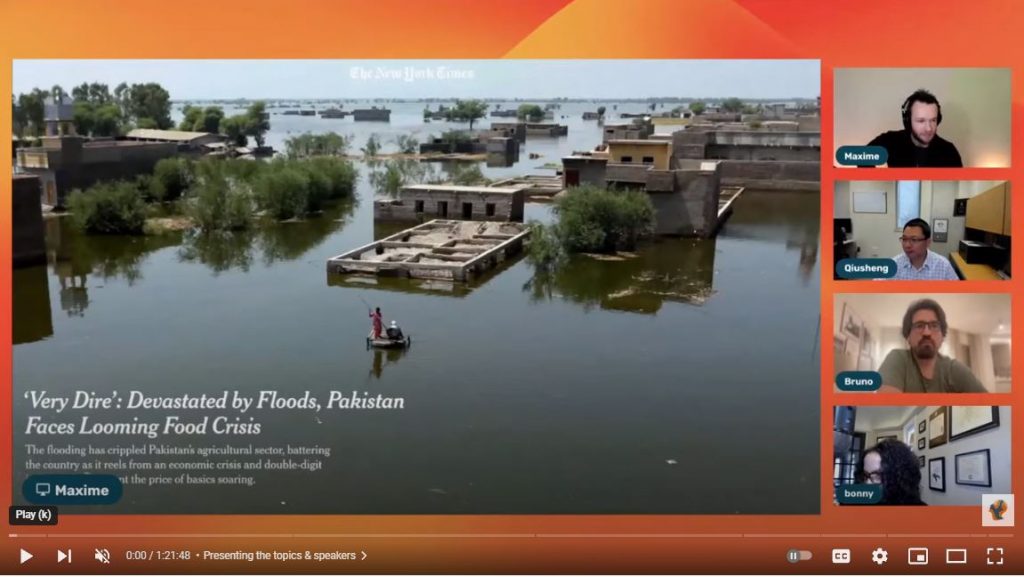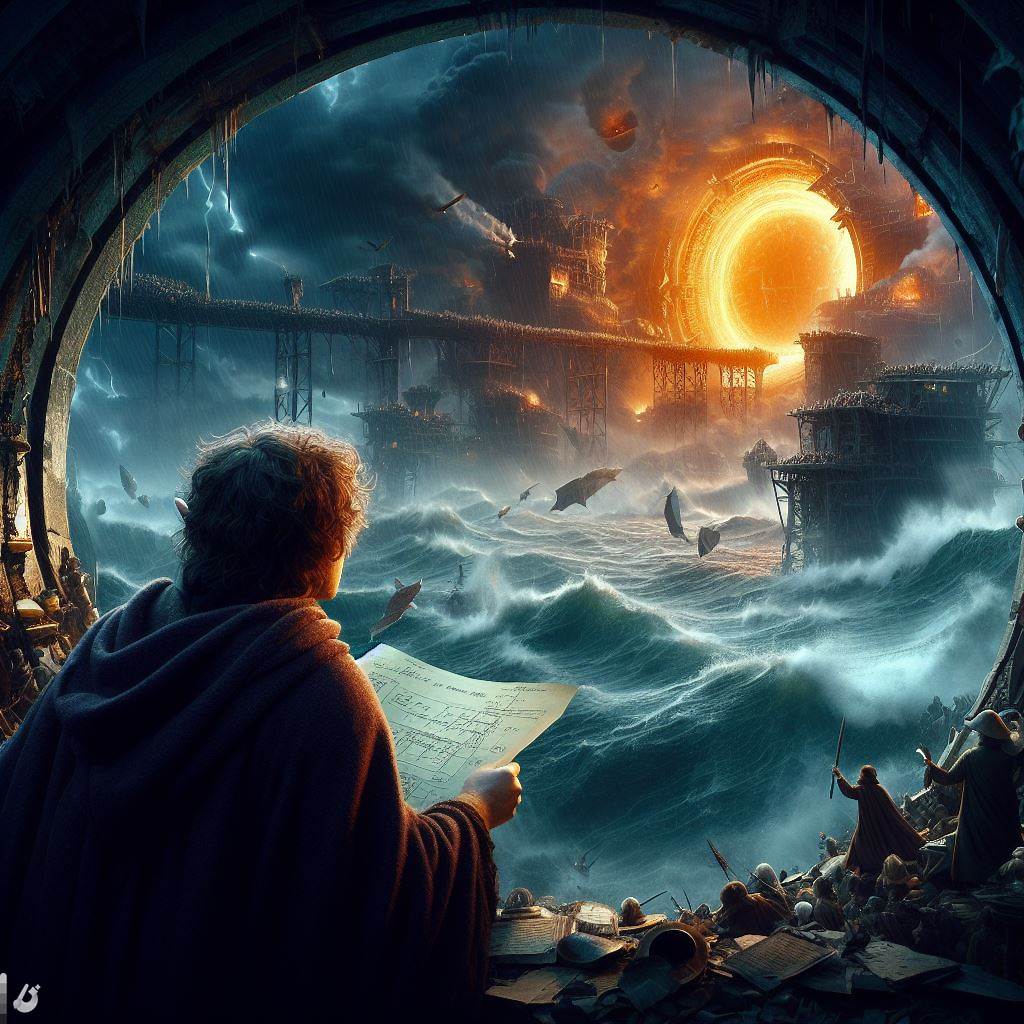Artificial Intelligence in the Water Sector
Free webinar: AI for HEC-RAS
Our July 2024 industry webinar covered practical AI applications for HEC-RAS, including the presentation of AI-powered coding environments to augment and extend HEC-RAS-based workflows. The presenters explored the capabilities of ChatGPTs code-interpreter to demonstrate low-friction, python-based data manipulation and analysis which would otherwise be traditionally performed in Excel or specialised applications. Additional details on the webinar, including Q&A responses and presenter background, are available here. View the recording of the webinar on the Australian Water School’s YouTube channel.
Upcoming Training Opportunities
Building on the free introductory webinar, our premium August 2024 webinar takes a deeper dive into AI applications for HEC-RAS, allowing attendees to take the leap to bringing coding back to a local notebook to execute. This webinar will provide in-depth demonstrations of the tools you need to start performing useful tasks with AI. You don’t need to be a programmer to follow along and create your first “hello world” pythons with AI assistance! Register here.
Our October 2024 course offers water resource professionals a comprehensive journey into AI-assisted coding, with a focus on utilising Jupyter Notebooks and the Cursor Copilot environment. You will start by mastering the basics of AI code generation, debugging, and knowledgebase management using Large Language Models (LLMs) such as ChatGPT. Additional course contents and registration links are available here:
Full Momentum Vodcast: AI for HEC-RAS
Watch this panel discussion on the RAS Solution YouTube channel for an expert panel discussion and demonstration of AI-related content, including the aptly named “Brunner Runner” that finally allows the HEC-RAS “running man” icon to do the dance:
free webinar: AI Tools for Modelling Innovation
Our free 1-hour industry event on 7 February 2024 was held in partnership with the Australian Water School. Our interactive webinar featured the visionary open-source expert, Dr. Qiusheng Wu, along with a panel of software developers and industry specialists who are harnessing Artificial Intelligence (AI), Machine Learning (ML), and Large Language Models (LLM) for applications in the water sector. View the recording on the AWS YouTube channel:
Additional details on the presenters, panellists, and background resources are available here. The free webinar leads into two premium webinars now available for on-demand registration, in which attendees receive all needed links and downloads to undertake the same exercises demonstrated in the free webinar. Premium webinars have a nominal cost of approximately USD $50; as a new roll-out in 2024, they are intended to provide practical, hands-on exercises without the time or cost commitment of a full course. Professional development certification is provided.
Our premium AI Segmentation webinar demonstrates the use of machine learning tools to extract and process water modelling data from aerial photos, satellite imagery, and terrain files.
The webinar is now available on-demand with recorded sessions and exercises provided to complete at your convenience. Register here.
Our premium HydroGPT webinar provides practical applications for harnessing GPTs and other large language models for water modelling. Note: interactive participation requires a ChatGPT Plus subscription.
The webinar is now available for on-demand registration with recorded sessions and exercises. Register here and complete at your own pace!
Previous webinar: ChatGPT and AI Water Applications
Our free ChatGPT webinar in 2023 featured QGIS plugins and a discussion about the future of AI by a panel of hydraulic modelling software developers. If you are unclear about the differences between Artificial Intelligence (AI), Machine Learning (ML), and Large Language Models (LLM), please watch Dr. Kobra Etminani’s concise 10-minute introduction of the subject at the beginning of the webinar. It was a lively discussion with 3,000 registrants, and we certainly appreciated the audience interaction. View the recording below and be sure to subscribe, like, and leave your own questions or responses in the YouTube comments section:
View details on the webinar content, presenters, and panellists on the AWS website. Written questions and answers from the live session are available here.
Previous webinar: AI Tools for Flood Assessment
We held a free 1-hour webinar event on July 5, 2023 highlighting practical applications of machine learning and other AI tools in flood modelling, including rapid assessments of the 2022 Pakistan floods and the Kakhovka Dam breach flood wave . View the recording below:
- Additional resources related to 3Di global as featured in the webinar are provided below:
Relevant scientific articles:
A semi-implicit numerical model for urban drainage systems
A finite volume approach for shallow water flow accounting for high-resolution bathymetry and roughness data
A high-resolution wetting and drying algorithm for free-surface hydrodynamics
Additional links referenced in the webinar:
- Parramatta Flood Early Warning System explained: https://youtu.be/PeXBaiYvEO0
- Editing and running simulations: https://youtu.be/Ii_fCEnfYVE
- Generating a computational grid: https://youtu.be/IgyvaEuMmbs
- Using floodbarriers: https://youtu.be/by4MS5DdEgY
- Demo software documentation: https://docs.3di.live/
Limited free of charge usage of the live site is available for 2D models, which are automatically generated based on a location chosen by the user.
Follow along with Dr. Wu with your own AI exercises covering “Visualisating and Analysis of the 2022 Pakistan Floods Using Earth Engine and Geemap” as featured in the webinar here:
Download the relevant files here: https://share.gishub.org/pakistan_floods/
Just for Fun?
In preparation for our first AI webinar, we asked some of the available LLMs water-related questions. Here is one we had some fun with:
We filled in the blank with Seinfeld, Seuss, Shakespeare, and the Swedish Chef. Pick a style and try it yourself using OpenAI’s ChatGPT model. Try Tolkien, Trump, or Tarzan; whatever your chosen style, you’re sure to get an amusing answer. Check out some of our favourite responses here., including a computer-generated tale of a flood modelling hobbit!
Last year’s geomorphology webinar even included a theme song written by ChatGPT. So is this just an entertainment gimmick? Are chatbots and Artificial Intelligence LLMs something to be feared? We’ve been asking Jeeves questions for over 25 years, so what is all the excitement about now?
LLM Water Questions
Can the incredible potential of AI be applied not just for fun but to provide practical benefits to the water sector? For example, could AI “learn” from the collective expertise of worldwide water professionals and pass that knowledge along to others? Try it yourself and see!
Below are some practical examples of water-related questions that we’ve used to put LLMs to the test:
- Are floods better described by their ARI or AEP? (maybe turn off Tarzan or the Swedish Chef first!)
- What’s the maximum VOC concentration in drinking water (alluding to our April 2023 webinar on tracing contaminants from the Ohio train derailment)
- A roadway is flooded 6 inches deep. Is it safe to cross? (Of course nobody should rely on a chatbot for an answer to this question; we’re just checking whether it’s aware of the latest research in vehicle buoyancy…that’s affirmative!)
- What’s the maximum Courant Number that should be used in flood modelling?
- Write a Python script to calculate the 1% AEP event from an annual maximum series. (Here’s the generated answer.)
- Will the Great Salt Lake dry up?
- What would happen if the Aswan Dam failed?
- What’s the roughness of concrete?
- What’s the correct citation for Australian Rainfall and Runoff?
- Now say it like a pirate! (kidding…but of course we tried it…and you can see ChatGPT’s response below…)
Submit your own ideas:
Use the form above to submit other water-related questions that a LLM might be able to respond to. Some answers may merely sound like Wikipedia reworded into a dialogue, but the coding required to generate some of the more complex responses – like the creation of a tale about a flood modelling Hobbit that we’ll demonstrate below – is quite impressive to say the least!
For developers:
If you happen to represent a software developer, academic, or professional development institution, please use the form above to submit your current approach and future expectations for incorporating AI into water modelling software, customer support, education, and training. Here are some written responses provided during our webinar.
Background Resources
Want to see a demonstration of some possible real-world LLM applications? Watch Hans van der Kwast (IHE Delft) explore the ChatGPT plugin for QGIS, and watch Ibrahim Demir (UI Hydroinformatics Lab) explain explain intelligent systems using AI for flood and well forecasting systems:
Brand new to AI? The brief animated introduction below provides some definitions for beginners and highlights a robot that has to figure out how to cross a stream with a plank. Our live introduction to AI, ML, and LLM was provided by Dr. Kobra Etminani from Halmstad University, who specialises in utilising applied intelligence systems for promoting a healthier society. If you want to see the relevance of her work to the water sector, replace the term “hypertension” in her introductory video below with “drinking water contamination”, “flood vulnerability”, “sea level rise”, or any other chronic syndromes affecting our planet’s stressed water resources. View Dr. Etminani’s 15-minute crash course from our April 2023 webinar for a succinct introduction to the relevant terminology.
META has recently released “Segment Anything” which automates many delineation tasks needed for hydrologic and hydraulic modelling.
View Kyle Thomson’s paper: Machine Learning to Improve Hydrologic Calibration and Reduce Risk.
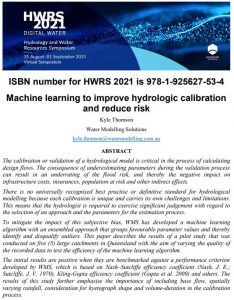
More papers, videos, and additional resources for AI applications for hydrology are included on the support page for our 2021 webinar covering technological advances in the water sector here, including links to the following papers and more:
- AI for High Precision Model Development (FMA 2021 paper by Jordan Maultby)
- Using AI for direct rainfall, runoff-routing, and FFA (HWRS 2021 paper by Jordan Maultby)
- Artificial Intelligence Solutions for the Water Sector, (IWA 2020 paper by Kapelan, Weisbord, and Babovic)
- See more about deep learning techniques for enhancing LiDAR data using Generative Adversarial Networks
Should we fear for our jobs?
We asked BingAI to come up with a promotional image for the webinar. Here’s the result:
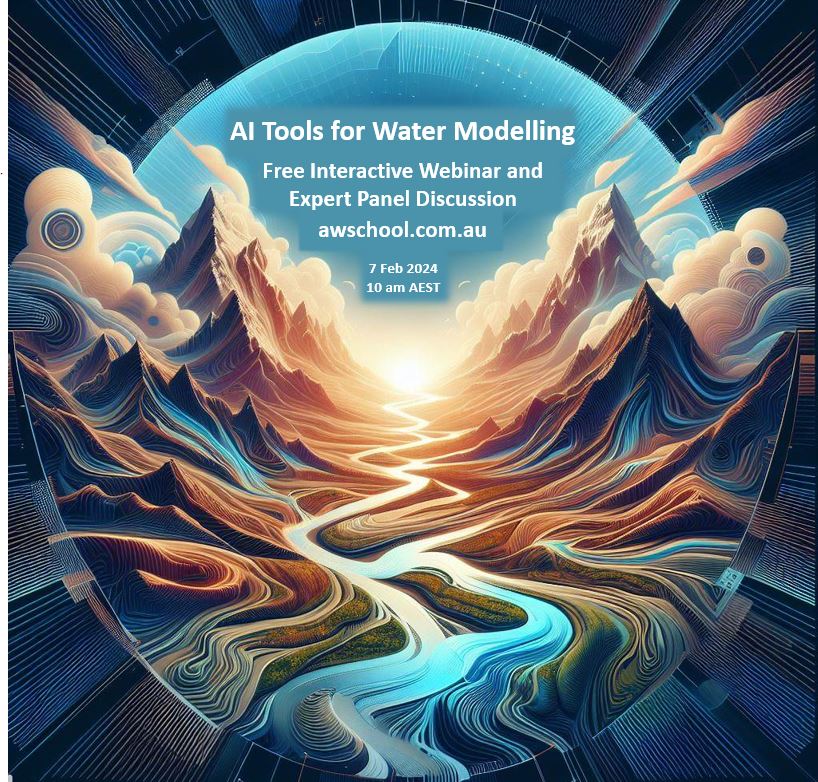
How do you think it did compares to a human graphic designer?
We decided to ask ChatGPT to facilitate one of our AI webinars to see if we could save some preparation time. Here are the opening and closing remarks it came up with. The impressive AI-generated responses seem to stack up well against real humans, so should our facilitators be fearing for their jobs? Based on the responses below, the computers assure us there is nothing to worry about…but isn’t that what you’d expect Skynet to say?
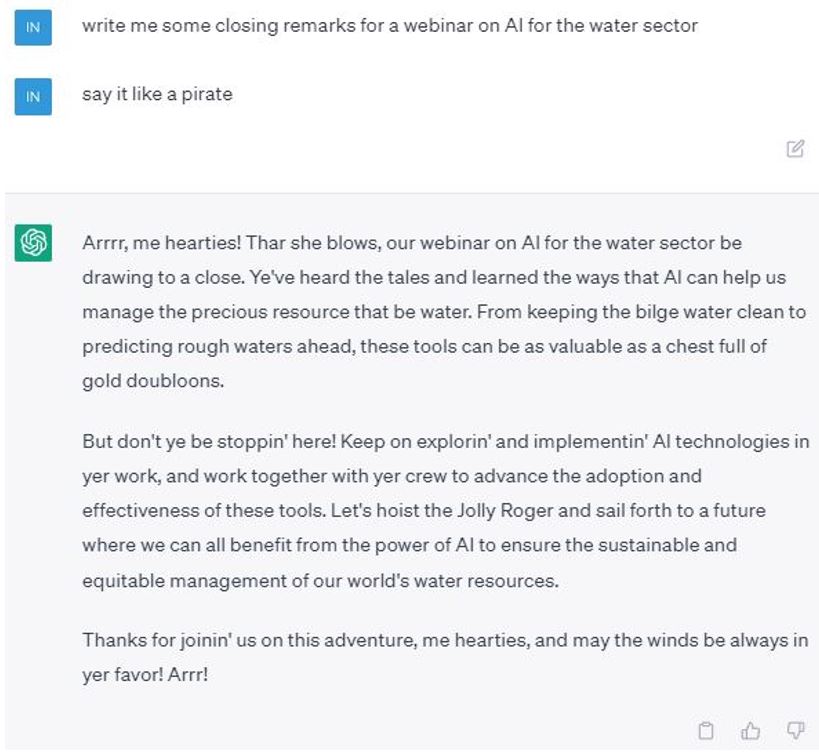
Upcoming Webinars
We hope you find our previous and upcoming AI webinars useful; we welcome you to join us for our remaining 2024 webinars listed here. We’ll be covering dam breach, bridge scour, palaeofloods, and more!
Contact us to submit suggested topics or presenters for future webinars.

